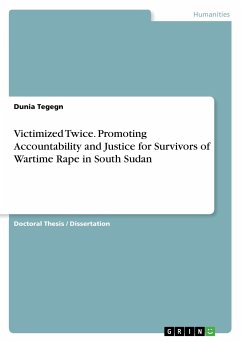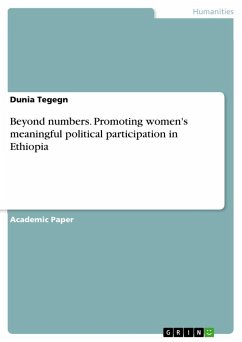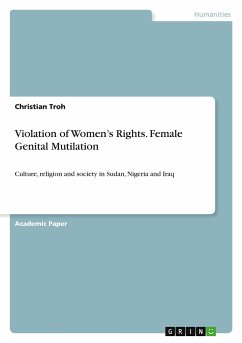Doctoral Thesis / Dissertation from the year 2016 in the subject Women Studies / Gender Studies, grade: A, Georgetown University, course: Leadership and Advocacy for Women Rights, language: English, abstract: In December 2013, South Sudan plunged into a massive scale of violence because of the outbreak of conflict between the Sudan Liberation Army and the Sudan People Liberation Movement. The fight took an ethnic turn as soldiers from the country's largest groups, the Dinka, and Nuer, divided their loyalties to either President Kiir or Mr. Machar respectively. While some civilians were caught in the crossfire, others were deliberately targeted along ethnic lines. Women are the immediate victims of this conflict because of rampant sexual abuse perpetrated against them. The gender discrimination South Sudanese women were subjected to in their society before the conflict contributed to their victimization during the conflict. Women suffered in the areas of educational access, domestic violence, non-recognition of marital rape, and forced marriage. Even though South Sudan's constitution, particularly under Article 16, provides full and equal dignity with men, women survivors of rape are still victims of gender-based discrimination due to the prevailing weak justice framework, and thus, victimized twice. Wartime sexual violence including rape, gang rape, and sexual slavery remains a shocking reality in South Sudan today. Women who survive rape face threats and experience trauma including a desire to kill themselves and Post Trauma Stress Disorder (PTSD). They also experience stigma. As a result, many women are very reluctant to report rape. Old women from the enemy's ethnic group are raped in order to make it clear to the enemy that they are incapable of protecting their mothers. The goal is to make the enemy feel emasculated, but women suffer the direct consequence. Women who refuse to be raped are shot through their private parts, and even those who are pregnant are forced into sexual intercourse. Some women become pregnant by their rapist.




![The Plurality of c[u-o]me: Transgressing the Soliloquies of Rape and Sex towards a Language of [Post-]Sexual Dialogue The Plurality of c[u-o]me: Transgressing the Soliloquies of Rape and Sex towards a Language of [Post-]Sexual Dialogue](https://bilder.buecher.de/produkte/60/60293/60293417n.jpg)



